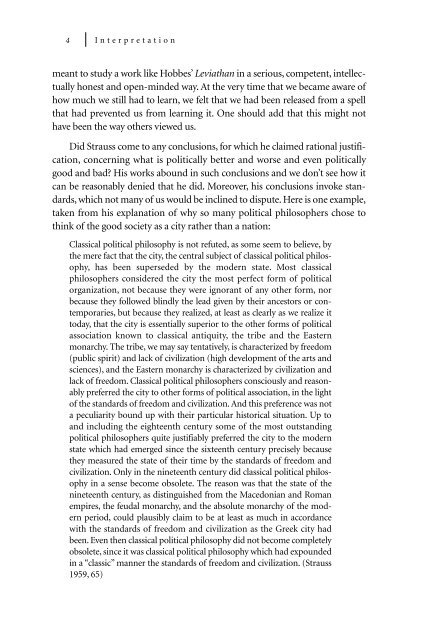Beyond Struggle and Power: Heidegger's Secret ... - Interpretation
Beyond Struggle and Power: Heidegger's Secret ... - Interpretation
Beyond Struggle and Power: Heidegger's Secret ... - Interpretation
Create successful ePaper yourself
Turn your PDF publications into a flip-book with our unique Google optimized e-Paper software.
4 <strong>Interpretation</strong><br />
meant to study a work like Hobbes’ Leviathan in a serious, competent, intellectually<br />
honest <strong>and</strong> open-minded way. At the very time that we became aware of<br />
how much we still had to learn, we felt that we had been released from a spell<br />
that had prevented us from learning it. One should add that this might not<br />
have been the way others viewed us.<br />
Did Strauss come to any conclusions, for which he claimed rational justification,<br />
concerning what is politically better <strong>and</strong> worse <strong>and</strong> even politically<br />
good <strong>and</strong> bad? His works abound in such conclusions <strong>and</strong> we don’t see how it<br />
can be reasonably denied that he did. Moreover, his conclusions invoke st<strong>and</strong>ards,<br />
which not many of us would be inclined to dispute. Here is one example,<br />
taken from his explanation of why so many political philosophers chose to<br />
think of the good society as a city rather than a nation:<br />
Classical political philosophy is not refuted, as some seem to believe, by<br />
the mere fact that the city, the central subject of classical political philosophy,<br />
has been superseded by the modern state. Most classical<br />
philosophers considered the city the most perfect form of political<br />
organization, not because they were ignorant of any other form, nor<br />
because they followed blindly the lead given by their ancestors or contemporaries,<br />
but because they realized, at least as clearly as we realize it<br />
today, that the city is essentially superior to the other forms of political<br />
association known to classical antiquity, the tribe <strong>and</strong> the Eastern<br />
monarchy. The tribe, we may say tentatively, is characterized by freedom<br />
(public spirit) <strong>and</strong> lack of civilization (high development of the arts <strong>and</strong><br />
sciences), <strong>and</strong> the Eastern monarchy is characterized by civilization <strong>and</strong><br />
lack of freedom. Classical political philosophers consciously <strong>and</strong> reasonably<br />
preferred the city to other forms of political association, in the light<br />
of the st<strong>and</strong>ards of freedom <strong>and</strong> civilization. And this preference was not<br />
a peculiarity bound up with their particular historical situation. Up to<br />
<strong>and</strong> including the eighteenth century some of the most outst<strong>and</strong>ing<br />
political philosophers quite justifiably preferred the city to the modern<br />
state which had emerged since the sixteenth century precisely because<br />
they measured the state of their time by the st<strong>and</strong>ards of freedom <strong>and</strong><br />
civilization. Only in the nineteenth century did classical political philosophy<br />
in a sense become obsolete. The reason was that the state of the<br />
nineteenth century, as distinguished from the Macedonian <strong>and</strong> Roman<br />
empires, the feudal monarchy, <strong>and</strong> the absolute monarchy of the modern<br />
period, could plausibly claim to be at least as much in accordance<br />
with the st<strong>and</strong>ards of freedom <strong>and</strong> civilization as the Greek city had<br />
been. Even then classical political philosophy did not become completely<br />
obsolete, since it was classical political philosophy which had expounded<br />
in a “classic” manner the st<strong>and</strong>ards of freedom <strong>and</strong> civilization. (Strauss<br />
1959, 65)
















